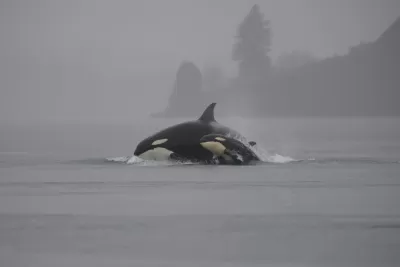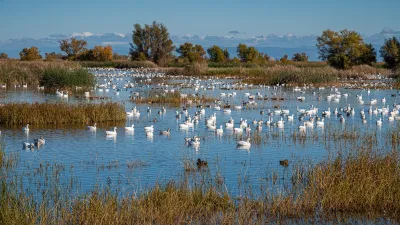Southern Resident orca numbers are distressingly low. The proposed budget would fund a number of measures to help the whales.

Governor Jay Inslee’s recently released proposed budget for Washington state includes $1.1 billion of funding for efforts to rescue the Southern Resident orca population, now down to just 74 whales.
Earlier this year, the governor convened a task force with members from public, private, and nonprofit organizations. "Some [Southern Resident Orca Task Force] members are calling the budget (which draws from the state’s transportation, capital and operating budgets) ‘unprecedented’ in terms of funding for not just orca and salmon recovery, but also for programs that protect the entire Puget Sound ecosystem," reports Hannah Weinberger.
The task force put together a report pointing to the most important actions needed to save the orcas, and members say that the governor’s budget hits on all these items. The greatest concern is helping the starving whales by increasing the number of salmon and the whales’ access to them. "Boosting chinook salmon — the Southern Residents’ preferred food — will require reversing the effects of habitat loss, hydropower and overfishing," says Weinberger.
In addition, the budget calls for a limit on vessel traffic in the area, including a three-year ban on Southern Resident whale watching, and removal of toxic chemicals in the orcas’ habitat.
Weinberger says that whale-watching operators are on board with the plan. More contentious is the possibility of breaching or removing dams on the Lower Snake River that make salmon migration difficult. The task force stressed the importance of involving communities that would be affected by dam removals in any future planning activities.
FULL STORY: The $1.1-billion orca plan could be a gamechanger

Alabama: Trump Terminates Settlements for Black Communities Harmed By Raw Sewage
Trump deemed the landmark civil rights agreement “illegal DEI and environmental justice policy.”

Study: Maui’s Plan to Convert Vacation Rentals to Long-Term Housing Could Cause Nearly $1 Billion Economic Loss
The plan would reduce visitor accommodation by 25% resulting in 1,900 jobs lost.

Planetizen Federal Action Tracker
A weekly monitor of how Trump’s orders and actions are impacting planners and planning in America.

Wind Energy on the Rise Despite Federal Policy Reversal
The Trump administration is revoking federal support for renewable energy, but demand for new projects continues unabated.

Passengers Flock to Caltrain After Electrification
The new electric trains are running faster and more reliably, leading to strong ridership growth on the Bay Area rail system.

Texas Churches Rally Behind ‘Yes in God’s Back Yard’ Legislation
Religious leaders want the state to reduce zoning regulations to streamline leasing church-owned land to housing developers.
Urban Design for Planners 1: Software Tools
This six-course series explores essential urban design concepts using open source software and equips planners with the tools they need to participate fully in the urban design process.
Planning for Universal Design
Learn the tools for implementing Universal Design in planning regulations.
Caltrans
Smith Gee Studio
Institute for Housing and Urban Development Studies (IHS)
City of Grandview
Harvard GSD Executive Education
Toledo-Lucas County Plan Commissions
Salt Lake City
NYU Wagner Graduate School of Public Service





























